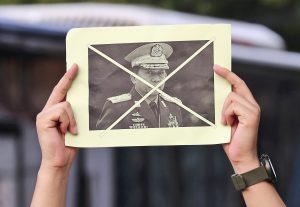A few days ago, brief hopes were kindled that Myanmar’s military, currently engaged in a campaign of violence and intimidation against persistent protests since the February 1 coup, was considering steps toward easing its crackdown.
At the April 24 summit of the Association of Southeast Asian Nations (ASEAN), Myanmar’s military leader, Senior General Min Aung Hlaing, appeared to agree with the group on “five points” of consensus. These included “an immediate cessation of violence in Myanmar” and “constructive dialogue among all parties” and that ASEAN would provide humanitarian aid and appoint an envoy to mediate. The language was weak and vague, but some governments took the document as an encouraging sign the regime was turning toward an exit ramp.
Two days later, the junta issued a clarifying statement quashing that hope. The junta said it will give “careful consideration to constructive suggestions made by ASEAN Leaders when the situation returns to stability in the country since the priorities at the moment were to maintain law and order and to restore community peace and tranquility.” ASEAN points of “consensus” are now “suggestions” to be considered at some indefinite future point.
Make no mistake: The junta statement is a crisp slap in the face to ASEAN members and their allies. Min Aung Hlaing, who besides leading a coup that overturned Myanmar’s democratic elections oversaw a military accused of crimes against humanity and genocide against Rohingya Muslims, played ASEAN leaders for fools.
Perhaps there is a silver lining. In abandoning any semblance of concession, the statement forces ASEAN and other governments to acknowledge the realities of the situation: The junta has shown no intention of taking meaningful steps to curtail abuses. This is nothing new. Myanmar’s military, which has ruled the country with a heavy hand for most of the last 60 years, has no history of making meaningful concessions to ASEAN.
Since the ASEAN meeting, the security forces have continued to threaten and arrest demonstrators. The junta has warned civil servants to return to work or face severe consequences. The leadership has done nothing to dial back its confrontational rhetoric.
The ASEAN summit’s failings demonstrate that standard diplomatic protocols are insufficient to deal with the Myanmar leadership — who are, after all, not diplomats but generals. The international community needs to speak to them in a language that even they will understand, using coordinated, targeted financial sanctions that will directly and significantly affect the military as an institution and its leaders as individuals.
While some governments have imposed economic sanctions on the junta leadership and a few of its companies, these measures haven’t been targeted enough to get at the junta’s main sources of income. Governments now need to take far tougher action to complement the courage shown by Myanmar’s Civil Disobedience Movement and demonstrate to the junta that the consequences for its brutality will only get worse.
Governments need to focus on stopping the junta’s access to foreign currency revenues, which are collected in overseas bank accounts as proceeds from selling the county’s natural gas, gemstones, valuable metals, stone, and teak wood. On top of simply sanctioning junta companies, governments should block transactions and freeze the bank accounts into which foreign revenues are paid, most of them held in the name of Myanmar’s Foreign Trade Bank. These targeted measures can be tailored to allow vital services provided by international companies to continue — for instance, gas production, operations of ports, and transportation services — while keeping the proceeds of those services out the military’s hands.
Stopping offshore foreign currency revenues also alleviates most concerns about negative humanitarian impacts on the people of Myanmar. As several independent groups focused on extractive industries transparency have documented, most of the money in question isn’t going to the Myanmar people anyway; it’s being stolen from them by the military leadership. Concerned governments might as well seize and hold those funds until they can be repatriated to a legitimate government for the benefit of the nation.
But to make these sorts of measures work, governments need to work together, coordinating law enforcement, intelligence, and monetary authorities across multiple jurisdictions. It will be challenging to chase down the dark money and the offshore accounts and enforce legal measures across different jurisdictions. It may also take time for consequences to lead to changes in policies and practices. Squeezing the junta’s cash sources, however, could be the only real strategy with a chance of pressuring the junta to restore democratic, civilian rule.
That’s why so many protesters in Myanmar are asking for stronger international sanctions: They know that only the very toughest of measures is going to get the junta to back down.

































